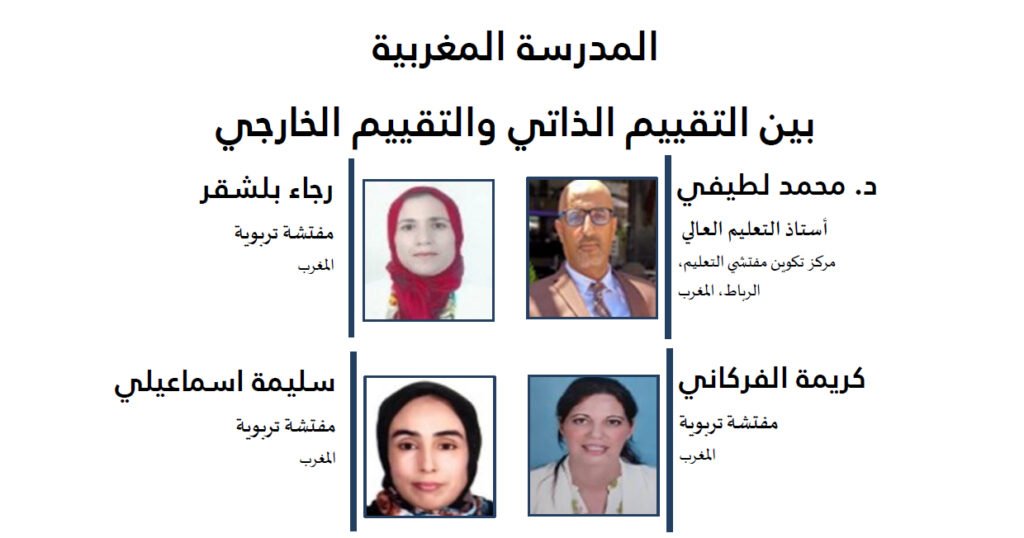المدرسة المغربية بين التقييم الذاتي والتقييم الخارجي

أستاذ التعليم العالي
مركز تكوين مفتشي التعليم،
الرباط، المغرب

مفتشة تربوية
المغرب

مفتشة تربوية
المغرب

مفتشة تربوية
المغرب
ملخص
لا يمكن تصور نجاح أي مشروع، اقتصاديا كان أو علميا أو تربويا، إنْ لم يَسترشد بمبادئ الحكامة الجيّدة، التي تستوجب إخضاعه لدراسة صادقة وموضوعية لمساره وسيرورته، في أفق كشْف مكامنِ قوته وضعفه، وهو العمل الذي تقوم به المؤسسات والدول لسائر مشاريعها وعملياتها. ويهدف بحثنا هذا إلى إبراز دور تقييم المؤسسة التعليمية، بأوجهه المختلفة، ومدى فعاليته الإجرائية، في الرفع من مردوديتها ونجاح مشروعها التربوي. يقدم هذا البحث مرجعا يمكن الانطلاق منه لبناء إطار مرجعي للمعايير والمؤشرات لتقييم أداء المؤسسة التعليمية، تؤهّل لإصدار الأحكام، بدقةٍ وموضوعية، ووضعِ مخطَّط يستهدف إرساء شبكة معلوماتية لاستجماع ما انتهتْ إليه عمليات التقييم. توصل بحثنا لتحديد نوعين من التقييم تخضع له المؤسسة التعليمية المغربية، التقييمُ الذاتي وهو تقييم داخلي وتقييم خارجي، وكلا التقييمين يعد نوعا من التغذية الراجعة، التي تساعد على صنع القرارات المناسبة، وتطوير الأداء، والإسهام في تخطيط البرامج ومراقبتها والتحقق من فعاليتها؛ للسّيْر بالمؤسسة التعليمية نحو الأهداف المرجوة منها، وتحقيق فلسفة التربية، التي تَصْرف الدولة في سبيلها ميزانية ضخمة. لذا، فإن الحرص على تطبيق آليات التقييم يخدم المؤسسات التعليمية، ويؤدي بها إلى التميز في تقديم خدمتها التعليمية، وفي خدمة المجتمع ككل؛ فتكون مخرجاتها - تبعا لذلك – متميزة، ومتلائمة مع متطلبات السوق محليّا ودَوليّا.
The success of any project, whether economic, scientific, educational, or otherwise, cannot be envisioned without being guided by the principles of good governance. This necessitates subjecting it to a sincere and objective study of its trajectory, strengths, and weaknesses. This is the work that institutions and states undertake for all their operations and projects. Our research aims to highlight the role of educational institution evaluation, in its various aspects, and the extent of its procedural effectiveness, in increasing its productivity and the success of its educational project. This research provides a reference from which to build a reference framework for standards and indicators to evaluate the performance of the educational institution, which qualifies it to issue judgments accurately and objectively, and to develop a plan aimed at establishing an information network to collect the results of the evaluation processes. Our research has identified two types of evaluation that educational institutions are subject to: self-evaluation, which is an internal evaluation, and external evaluation. Both evaluations are a type of feedback that helps in making appropriate decisions, developing performance, and contributing to planning, monitoring, and verifying the effectiveness of programs; to move the educational institution towards its desired goals and achieve the philosophy of education, for which the state spends a huge budget. Therefore, keenness to implement evaluation mechanisms serves educational institutions and leads them to excel in providing their educational services and in serving society as a whole; their outputs are therefore distinguished and compatible with the requirements of the local and international market.
كلمات مفتاحية: التقييم الذاتي، التقييم الخارجي، الافتحاص، المدخلات، المخرجات، المعايير، المؤشرات.
Keywords : Self-evaluation, External- Evaluation, Audit, Inputs, Outputs, Criteria, Indicators
